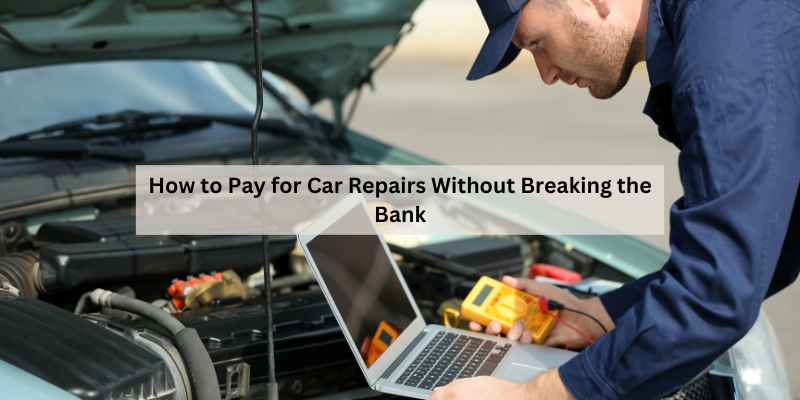How to Pay for Car Repairs Without Breaking the Bank
Pay for car repairs using cash, credit cards, or financing options. Explore payment plans offered by repair shops for more flexibility.
Car repairs can be unexpected and costly. Knowing how to manage these expenses can ease financial stress. Many people feel overwhelmed when facing repair bills. Understanding your payment options can help you make informed decisions. Whether you have savings set aside or need to rely on credit, various methods can work for you.
Some repair shops even provide financing plans, allowing you to pay over time. It’s essential to assess your budget and choose the best payment method for your situation. This approach not only ensures your vehicle gets the necessary repairs but also keeps your finances in check.
The Reality Of Car Repair Costs
The cost of car repairs can vary widely. It depends on many factors. Labor costs, parts, and vehicle type all matter. Some repairs are more expensive than others. Understanding average expenses helps in planning.
| Repair Type | Average Cost |
|---|---|
| Oil Change | $30 – $75 |
| Brake Pads Replacement | $150 – $300 |
| Transmission Repair | $1,000 – $3,500 |
| Engine Repair | $500 – $1,500 |
Factors like vehicle age, location, and mechanic expertise influence costs. Older cars often need more repairs. Local labor rates can also vary. Specialty shops might charge more for unique repairs.
Budgeting For The Inevitable
Budgeting for car repairs is essential. Setting aside funds regularly can help. Aim for a specific amount each month. This makes unexpected costs easier to handle.
Emergency savings play a critical role. These savings can cover sudden repairs. A good rule is to save at least $500. This amount can handle many common issues.
Consider using a separate savings account. This helps keep your repair fund safe. Regular deposits ensure you are always prepared. A little effort goes a long way.
Insurance And Warranties
Understanding your insurance coverage is very important for car repairs. Check your policy for deductibles and limits. Some repairs may be fully covered while others may not. Always contact your insurance agent for clarification.
Extended warranties can offer extra peace of mind. They cover repairs beyond the standard warranty. However, they can be expensive. Consider the pros and cons before buying one. Here’s a quick comparison:
| Pros | Cons |
|---|---|
| Peace of mind | High costs |
| Coverage for major repairs | Limited options |
| Transferable to new owners | May not cover all issues |
Exploring Financing Options
Personal loans for auto repairs can be a great option. They often have lower interest rates than credit cards. Compare different lenders to find the best deal. Pay attention to the loan terms and fees. This helps in making an informed decision.
Credit cards can also be used for repairs. Using them responsibly is key. Always pay your balance in full to avoid high interest charges. Some cards offer rewards or cashback for purchases. This can help save money on future repairs.
Choosing The Right Repair Shop
Choosing a repair shop can feel overwhelming. Start by comparing rates from different places. Look for shops with positive reviews online. Happy customers often share their experiences. Make a list of the top-rated shops.
Negotiating repair costs is essential. Don’t hesitate to ask for a detailed estimate. This helps you understand what you pay for. If the price seems high, ask for a breakdown of costs. Many shops may offer discounts or payment plans.
| Shop Name | Rate | Review Score |
|---|---|---|
| Auto Fix | $100/hr | 4.5/5 |
| Quick Repairs | $90/hr | 4.7/5 |
| Fast Service | $110/hr | 4.0/5 |
Diy Repairs And Maintenance
Learning basic car repair skills can save you money. Start with simple tasks like changing the oil. Understanding how to replace brake pads is also helpful. You can learn these skills through online videos.
Many tools are essential for DIY repairs. A basic tool kit should include wrenches, screwdrivers, and pliers. A jack and jack stands are necessary for lifting the car safely. Don’t forget to have safety goggles and gloves.
Online resources offer step-by-step guides. Websites and forums can provide valuable tips. Local workshops may also host classes for beginners. Practice makes perfect, so start small and build your confidence.
Cost-effective Parts And Supplies
Choosing between aftermarket and OEM parts can save you money. Aftermarket parts often cost less. They can perform well, but quality varies. OEM parts are made by the original manufacturer. They usually come with a warranty. This can make them more reliable.
Finding deals and discounts is key to saving. Check local auto parts stores for sales. Online retailers often have promotions. Websites like eBay or Amazon may offer lower prices. Consider using coupons for extra savings. Joining loyalty programs can also provide discounts.
Preventative Measures
Regular routine maintenance helps keep your car in top shape. Check the oil, brakes, and tires often. A good schedule can prevent major problems.
Driving habits can greatly reduce wear on your vehicle. Avoid rapid acceleration and hard braking. Smooth driving saves fuel and keeps parts longer.
Stay within speed limits to avoid stress on the engine. Use cruise control on highways for better efficiency. Keep your car clean to prevent rust and damage.
Frequently Asked Questions
How Can I Budget For Car Repairs?
Creating a budget for car repairs starts with tracking your expenses. Estimate potential repair costs based on your vehicle’s age and condition. Set aside a specific amount monthly in a dedicated savings account. This will help you manage unexpected repairs without financial strain.
What Payment Options Are Available For Car Repairs?
Most auto repair shops accept various payment methods. You can use credit cards, debit cards, cash, or personal checks. Some shops also offer financing options or payment plans. Always inquire about available options before authorizing repairs to ensure you choose the best method.
Are There Financing Options For Car Repairs?
Yes, many repair shops offer financing options. These plans may include low-interest credit or monthly payment arrangements. Always review the terms carefully before committing. This helps you avoid high-interest rates that can add to your repair costs.
How Do I Choose A Reliable Repair Shop?
To find a reliable repair shop, ask for recommendations from friends or family. Check online reviews and ratings on platforms like Yelp or Google. Look for shops that are certified and have a good reputation. It’s essential to choose a shop that communicates clearly and offers transparent pricing.
Conclusion
Car repairs can be daunting, but there are many ways to manage the costs. Budgeting wisely and exploring financing options can ease the financial burden. Remember to prioritize necessary repairs and seek quotes from multiple mechanics. Taking these steps ensures your car remains safe and reliable without breaking the bank.






